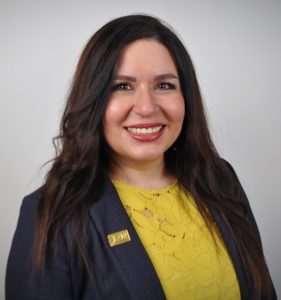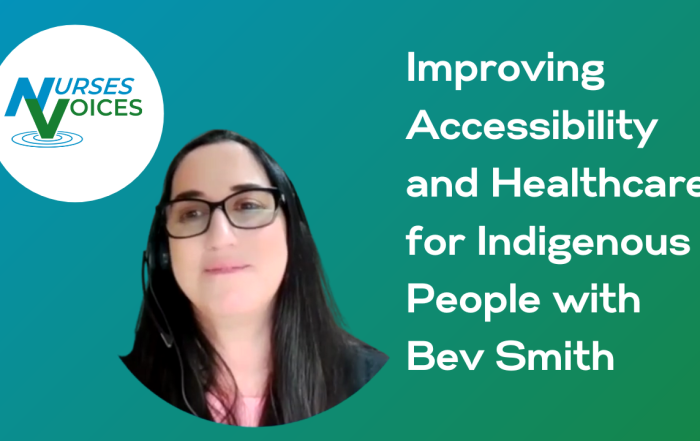[00:00:00]
Gail Donner: Today, on Nurses’ Voices we’re going to talk about long-term care and you’re going to meet some outstanding nurses. So stay tuned.
[00:00:10]
Announcer: This is nurses voices. Nurses. Voices is supported by the Canadian nurses foundation and by the Canadian nurses association,
[00:00:20]
Gail Donner: this is nurses voices. I’m Gail Donner I’m Mary Wheeler, and we have a treat for you in this episode. You are going to meet two amazing nurses working in long-term care, proud of it and doing amazing work.
First of all, let me introduce you to Bahar Karimi, who is a registered nurse a healthcare executive, and actually a PhD student as well. Bahar is passionate about long-term care and about compassionate leadership and is currently the administrator of Idlewyld Manor, which is in 192 bed long-term care home in Hamilton, part of the Thrive Group.
Sarah McNally is an RPN,. Registered Practical Nurse, with a passion for long-term care as well. And she’s currently working at the Thrive Group’s Idlewyld Manor with Bahar. Uh, these two have lots to talk about, so we’re going to get right, right into it. And if I could Sarah, I’m going to start with you.
The pandemic has had absolutely devastating effect on not just older persons, but anybody in longterm care. And it’s been most pronounced in Ontario and in Quebec. And I know Sarah that you had experienced right in the thick of it with a big outbreak and a lot of very sick and sadly residents also passed away.
[00:01:58]
Sarah McNally: It was scary.
And, um, I just remember the resilience of, of my team and how amazing the workers of long-term care are. And I remember specifically one shift stood out where I was working a 16 hour shift. We were right in the depths of the, the outbreak and three o’clock rolled around and I had one PSW show up and. We just kind of looked at each other and it was the two of us.
And we had about 25 residents and we didn’t say a word we just started working. All I cared about was our residents. So we started working and I remember standing in front of a room and I was, I was tying up my gown to go in. And behind me, somebody came up and started tying my gown and I look behind me and the management team was on the floor.
They were, they were delivering trays and they were doing care. And then. About a half an hour after that, all of the PSW that were assigned to that home area, they came into their shift and, um, they just started working. And many of them, it was their only day off in, in two weeks and they showed up and within.
Probably about a half an hour. We had eight people on the floor working when it was just meant to be the two of us. Those are the stories that, that I want people to hear. And there’s so much negativity in the media and they’re not hearing these heroic stories of the incredible people of longterm care that I work with.
And. We all just have this drive. It seems, and we care about our residents so much and it keeps us going.
[00:03:41]
Gail Donner: Incredible, I was going to follow up a little bit and maybe you could talk a little bit about the residents themselves and how, how in this kind of crisis you determined. Who needed what, when, how…
[00:03:56]
Sarah McNally: It was hard. We obviously had to limit all family members from coming in so that there was this huge lack of social connection for our residents.
And that’s huge for them because that’s their connection with the outside world. As much as I wanted to do medically, like as a nurse, I, I knew they needed so much more. And so. A lot of what we focused on was video calls. And, and one of the things we did was, um, the family members of the residents, residents came in and they decorated the courtyard for Christmas, with all these Christmas lights and, and lit up for a couple of weeks.
And it was, it was incredible. And, and those are the things that they needed the most during that time.
[00:04:43]
Mary Wheeler: Is that how you met Bahar? You were both working in the same facility
[00:04:48]
Sarah McNally: So our paths kind of cross differently. And, and that, um, my director of care from that home knew Bahar and they brought me on board to, to Thrive Groups.
So we were working different places, but as soon as I met Bahar, I was. I want to work for her. She’s, she’s incredible. She’s inspirational and a huge in the long-term care field.
[00:05:11]
Gail Donner: So maybe it’s a good chance Bahar for you to talk a little bit about your
experience.
[00:05:17]
Bahar Karimi: In the beginning of the pandemic, I was also working somewhere else and that home was, was a high risk home just because of the age of the building and the population of the residents that we were serving and just the location, which was downtown Toronto and the numbers of COVID positive cases were high. And then we did the not know much about COVID. So a lot of things that we were doing were guessing games, and we were really trying very, very hard to keep ourselves up to date with the directives that we were receiving with the directions that we were getting.
Public health units, from the ministry. And I have the similar experience as, as Sarah does although, we were lucky that a COVID didn’t hit our home and our residents hard. Although the risk was very, very high. The heroism of our team members. Our residents, their family members was inspiring. And the resiliency that Sarah observed I did as well every day.
Um, and I feel that, um, although this pandemic has put our sector in a highlight and our gaps in the sector has been really highlighted. Also the compassion, the resiliency, um, the competency of those who work in long-term care sector is also being highlighted as well. Especially during the first several months of the pandemic that we were working with.
Pretty much, no knowledge. And we were really hit hard. The sector was really hit hard.
[00:07:01]
Gail Donner: So when you moved to where you are now, when you do the administrative Bahar where you are now.
[00:07:06]
Bahar Karimi: It was not an easy decision. I loved and I still do love my previous home so much. That’s my family that I left behind in the middle of a pandemic, but that home was in good hands.
I knew that we had structure in place that the capacity was there too for the home to move on without me. I also have a big love for Thrive Group. I actually worked for Thrive Group before I became an administrator. Um, so I knew the team very, very well. So, uh, when the opportunity came up and this home was new to me, Idlewyld is new to me, but it’s walking distance from home.
I felt that I can actually have some work life balance. Uh, for myself, I could actually walk to home. I can give back to my own neighborhood and my community, and I felt that I was needed more in this home. It was a family to me as well. So that was a hard decision, which was also easy.
[00:08:09]
Mary Wheeler: Then Sarah, you followed Bahar. What drew you there?
[00:08:13]
Sarah McNally: I think the big thing with them is innovation and trying new things. And that is a huge thing in long-term care, especially when you’re working with things like dementia, you have to be. Creative. And I am, I found in other homes, a hesitancy to, to try new things and Thrive Group is all about that.
And, and we’re constantly trying new things. And, and that was a really important thing to me.
[00:08:39]
Gail Donner: Can you tell us maybe a bit about an innovation.
[00:08:42]
Sarah McNally: We have big plans for a memory care unit. And right now we started cleaning up the area. Cause we’re gonna create all these different stations. We’re going to have a section for kind of like a laundry room, like kitchen, things like that
[00:08:57]
Mary Wheeler: I’m so impressed with the two of you often long-term care is profiled, people are leaving, but when I listened to the two of you, there’s so much energy and compassion. And this is where you want to be. What makes it work for the two of you?
[00:09:13]
Bahar Karimi: When I decided that I want to start my leadership journey in long-term care. I was discouraged. I was told that I’m too smart for long-term care.
I’m too passionate for long-term care. I can grow very fast and I can develop my career. Much faster. If I go into acute care, that was actually a sign for me because I had experience as a frontline staff in all sorts of sectors and the hospital sector and community in home care and in long-term care. And I knew that if that’s what the world outside is perceiving long-term care to be that doesn’t deserve smart people or passionate people that I want to be what draws me.
To our sector is that you get to be competent. Skilled also compassionate. You get to build relationships. You get to demonstrate leadership every day. Regardless if you are frontline staff or you have an official leadership position, you get to go to work everyday and lead. If you are innovative, this is the sector to be especially these days and a lot of pervation is happening. And I know I have many friends in different long-term care homes, and I hear the stories of long-term care homes every day that they actually not only are promoting evidence-based practices and best practices. They are promoting promising practices.
Those that they are not tested yet, but they have lots of potential to change the level of care and the quality of life that our residents are receiving within the sector.
[00:11:02]
Gail Donner: It’s funny, you use the term promising practices. I’m looking at Sarah and thinking you’re also looking at promising professionals, promising nurses.,
[00:11:14]
Sarah McNally: Similar to Bahar, I really felt the stigma around long-term care. I actually did my pre-grad placement for school in long-term care. And I remember specifically my lab instructor coming over and she. Don’t worry, just get through this. Then you can get a real job in a hospital. It was my favorite experience. I did my two previous placements in acute care, and I got into long-term care and felt this is where I want to be.
And I think the biggest thing is that. The people working in long-term care, have a passion for it, and they want to be there and they have this drive that keeps them going. And, and you often hear of these crazy 16 hour shifts that long-term care workers do. And it’s because we love our job. We love to be there.
There’s always so much room to grow. There’s different areas. I mean, you have palliative care, you have responsive behavior management. So many different things. And I also love that it focuses on people as a whole, in acute care. If you have cardiac issues, you go to a cardiac unit. If you have renal issues, renal, but in long-term care, we focus on everything.
[00:12:31]
Gail Donner: What both of you have said about the stigma and the kind of discouragement that a younger nurses, newer nurses get. What is your recruitment experience?
[00:12:42]
Bahar Karimi: I actually, um, have been a personal support worker, an RPN and an RN. Myself and the frontline recruitment is hard. Once we have done specifically at Idlewyld Manor is highlighting what is going on in the home that is positive.
That is motivating . And I think that has been really successful for us because especially during COVID, we also experienced. Uh, being short-staffed, but that didn’t bring us down. We still realize that we’re in people’s home and we’re their family. So there was always music. There was always color.
There was always laughter our residents still continue to help our staff members to decorate the home areas, the door of the home areas. There is always a theme happening. And we started to highlight those pieces that are happening in our home. That shows that our lives are not just full of COVID, we’re actually living our lives.
And we are right now connected to our residents more than ever before, because then they need us more than ever before they get to see just one family member. And that’s a wee, we become their family members. I think the key success for Thrive group and specifically Idlewyld was to highlight those moments, that show that you come and join us and you feel that motivation, that passion and that success with us.
[00:14:13]
Mary Wheeler: Well, it’s interesting, Bahar , cause I follow you on social media and I’ve mentioned to Gail recently, that’s what you do. You post all the things that are happening. And I see the comments from other people and that’s an amazing way to tell an amazing story.
I listened to the struggle families have had over the last more than a year.
How do you re-engage families now,
[00:14:39]
Bahar Karimi: Families have been our rocks. They have been just wonderful. So understanding so supportive, we are all suffering together. They are living the life of the pandemic, just like anyone else. Although they’re missing loved ones who live in long-term care so much. They also understand that the risk is why.
So they have been very resilient and we need to take care of them as well as nurses, we feel responsible that we need to support these caregivers, family members to get through this trauma and to get back to what life was normal, whatever that was.
[00:15:23]
Gail Donner: Sarah just on that same thing right at the front line. You must have experienced family being distressed.
[00:15:31]
Sarah McNally: A big thing for us was going virtual with a lot of things. And we tried to integrate window visits and video calls and things. And I found a lot of the times I spent was just calling family members. And even if I didn’t have something super important to tell them, they just want to take, to hear your voice and to hear how their loved ones were doing.
[00:15:55]
Gail Donner: You talk about compassion. I think that’s what you talked about. That, that’s what I’m hearing. I’m wondering because our time is just about up. Whether there’s something either of you feel strongly, that you would like to say, is there any message you would like to give?
[00:16:13]
Sarah McNally: The biggest thing would just be to give long-term care chance.
And, and even if you’re young and just going into the field, don’t listen to the voices around you telling you that it’s somewhere where people go, when they’re retired, there’s so much room to grow as a young nurse. And I would just tell everybody to give it a chance because I love it. It it’s my passion.
[00:16:37]
Bahar Karimi: Absolutely agree with Sarah and what we have highlighted today for you, Sarah and I is good things about Idlewyld Manor, but I want to tell you these things happen in all long-term care homes, that passion, that compassion, that beautiful life that we, we try to make for our residents. That is where you can actually grow your leadership skills very, very fast. And you can, you can get as innovative and as creative that you want to be. So I agree with Sarah, give us a chance.
[00:17:10]
Gail Donner: Really, all I can say is thank you doesn’t quite say how meaningful this has been.
[00:17:17]
Mary Wheeler: I think nurses across Canada, as you said earlier, need to hear there’s so much positive energy, compassion, professionalism happening in long-term care.
And this is the future.
[00:17:30]
Gail Donner: I’m thinking, uh, if we have enough of you, long-term care is in great hands. Thank you both very, very much. This has been really a special episode.
Well, I don’t know about you, Mary, but that was amazing.
[00:17:44]
Mary Wheeler: That was great.
[00:17:46]
Gail Donner: Like I said, poster-women for long-term care. So on that theme , what, what, what was your takeaway?
[00:17:54]
Mary Wheeler: Well there were a couple of takeaways, but the one that is just resonating for me builds on the conversation we had with Chantelle and Chantel and if you recall, they talked about storytelling being a skill, and that education was really important. And that’s what I heard here again, is that what education is like for example, Bahar and Sarah.
They should be teaching long-term care programs or teaching in some, some faculty.
[00:18:28]
Gail Donner: Yeah. I agree with you. And I think that is a very powerful message. Imagine being told you’retoo smart for long-term care. Where, where do we need smart, creative people? If not long-term care. Not just now, but in the future. I’m also struck with this is bigger than just long-term care.
This is about where do young people, even kids in school. Where do they learn about the valuing of aging , of people with disabilities of people who have to live in a long-term care home, hopefully a home, not an institution. And where are they going to start to value?
And then we don’t even pay the same thing to people in long-term care.
As we do to people in acute care. So as a society, as a profession, as a sector, The valuing just isn’t there. Neither of the residents, neither of the professionals and the workers who, who worked there. That’s the sad part.
[00:19:40]
Mary Wheeler: Now I, that’s so true, Gail, because if you are working in a world or a sector where people are putting you down, Sarah said all the stories are all the things that are going wrong in long-term care.
Why aren’t we talking about things that are going right in long-term care? So then you have the fear of families and individuals. Oh my God. I don’t want to send someone to long-term care. My family member. We need to be really flipping this to say. Uh, just as you talked about, there is value in these settings, the individuals that are working there are professional, they’re smart they’re experts.
And that they’re this, this is a place where individuals, both people working within long-term care and those using long-term care have the potential to thrive.
[00:20:33]
Gail Donner: We hope you’ll give us some feedback. Go to www.nursesvoices.ca give us some feedback. We’d like to hear it from you because maybe that’s the way to start some of what we’ve been talking about.
It’ll be great to hear from, other nurses in long-term care and about their experiences.
[00:20:55]
Announcer: Nurses’ Voices Is created by donnerwheeler. It is supported by the Canadian Nurses Foundation and the Canadian Nurses Association. Nurses’ voices is produced by Cecktor limited.













